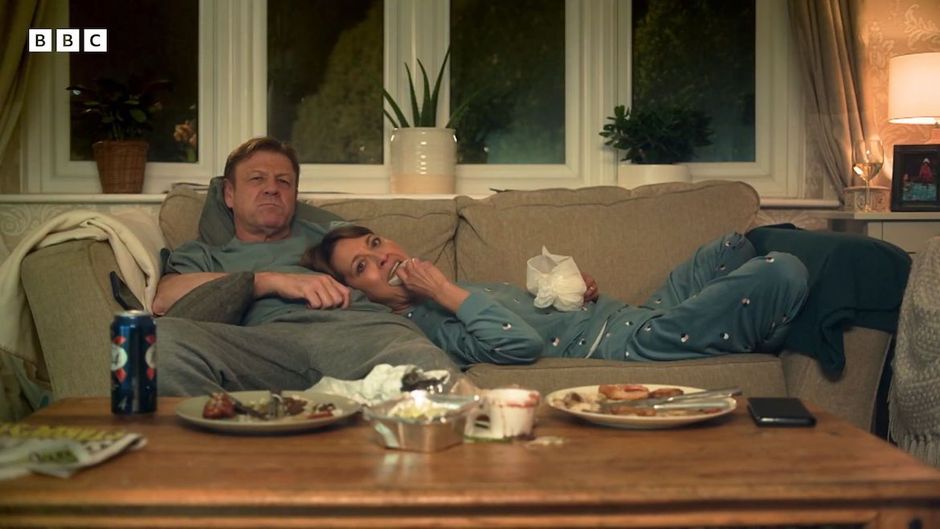The faithfulness weirdo
The idea of spending a lifetime with the same person is increasingly surprising when it comes to marriage. The surprise, however, cannot hide our longings.
23 FEBRUARY 2024 · 18:00 CET

Many strange love stories have been written and filmed. Names like Love, by Haneke, or Her, starring the award-winning Joaquin Phoenix, remain in our recent memory.
Perhaps there has been a lack of more leading names in television, although in the platform era there have been some worthwhile independent titles, especially in Europe.
One of those recent titles (2022) is the four-part miniseries Marriage, created and written by Stefan Golaszewski for the BBC.
With a minimalist aesthetic and a very simple mise-en-scène, this production has turned out to be a real discovery.
Its strength lies in a well-crafted and realistic script, and in the magnificent performance of Nicola Walker and a natural Sean Bean (Boromir in Lord of the Rings and Ned Stark in Game of Thrones).They develop the story, while the few supporting actors who appear have a reduced role and practically depend on the two main characters.
Eager to create a realistic and accessible story, Golaszewski claims that “Marriage is about what it is actually like to be a person instead of what it is like on television or in fiction. People don’t really know what they feel. They think they feel one thing but often feel something else”.
“They often don’t know what to say to each other. We don’t experience life as big thunderstorms, it’s more like constant drizzle, and that’s what the show explores”, he added.

The beauty of the daily life
Golaszewski doesn't lie. His series reflects a portrait of marriage that many will find so realistic and relatable that it has received outstanding reviews in the UK.
Combining comic irony with a sense of natural heartbreak as events unfold, Marriage depicts the day-to-day life of a 30-year marriage between two people who come to know each other well but who, deep down, know that they are still strangers to each other.
The tensions caused by the work imbalance, the clashes between son-in-law and father-in-law or a conversation about potatoes show the brilliant moments of this mini-series.
It is a unique exploration of the ordinary in which Golaszewski tackles the daily lives of married people without complexes and without seeming to care whether or not the subject is popular at the moment.
In the end, no matter how much emphasis is placed on 'polyamory' and the like, it is always time to talk about marriage and we always need it to be done in a realistic way.
Marriage tells a particular story, but without pretensions to greatness. It is as simple, plain and even monotonous as the marriage life it tries to reflect.
It is not another postmodernist criticism of marriage as something worn out and reduced to its capacity (or not) to keep up an active sex life. Golaszewski presents a truly human story that leaves no one indifferent.
We need stories that dig beyond the surface to show us that there is still beauty in the ordinary. A simple beauty that is not false and does not require great effort to be found. That beauty is worth living.
In the end, Golaszewski succeeds in taking his mind off the screen to film life itself.

Real love
The loves that the director presents in his miniseries are imperfect. Sometimes they are unattractive. It is possible to think that if that is marriage, who would want it?
But the tenderness of his story can be moving, because it is precisely in the imperfections that the need to be loved is most evident.
Who does not want to be loved just as he or she is? Who does not hope to reach the end of life loved no matter what?
Although the idea of spending a lifetime with the same person is increasingly surprising when talking about marriage, and may in fact be unnecessary, the surprise, however, cannot hide our longings.
Even critics of faithfulness want something that remains faithful in their lives. Not even polyamory advocates can get away from the fact that we need to be loved, and that in itself implies fidelity.
The idea of a love that does not need to be faithful is yet another misleading concept and has to do with the fantasy of wanting to have fun without the need to be committed.
Golaszewski's series is unpopular for its time, precisely because it challenges all these considerations. It does not hide how selfish we can be. Nor how misguided some of our desires can be.
But the director strives to subdue everything under the idea of faithfulness. A difficult, hard-working, irritating but, in the end, beautiful faithfulness.
The Catalan writer Montserrat Roig entitled one of her books Digues que m'estimes encara que sigui mentida (Tell me that you love me even if it is a lie). In the face of the postmodern idea of fantasising about what we do not have but desire, and end up believing it as an inherent right to our situation, loving faithfulness in our marriages may still reflect God's perfect design.
“Our marriages are the metaphor”, said a British preacher speaking of Christ's union with his church.
Golaszewski works without complexes, and that is something to celebrate.
He reminds us that, regardless of everything, the realistic thing is still to remain faithful and to live by finding that beauty in daily life that only faithfulness can guarantee.
Jonatan Soriano, journalist in Barcelona, Spain.
Published in: Evangelical Focus - Features - The faithfulness weirdo
